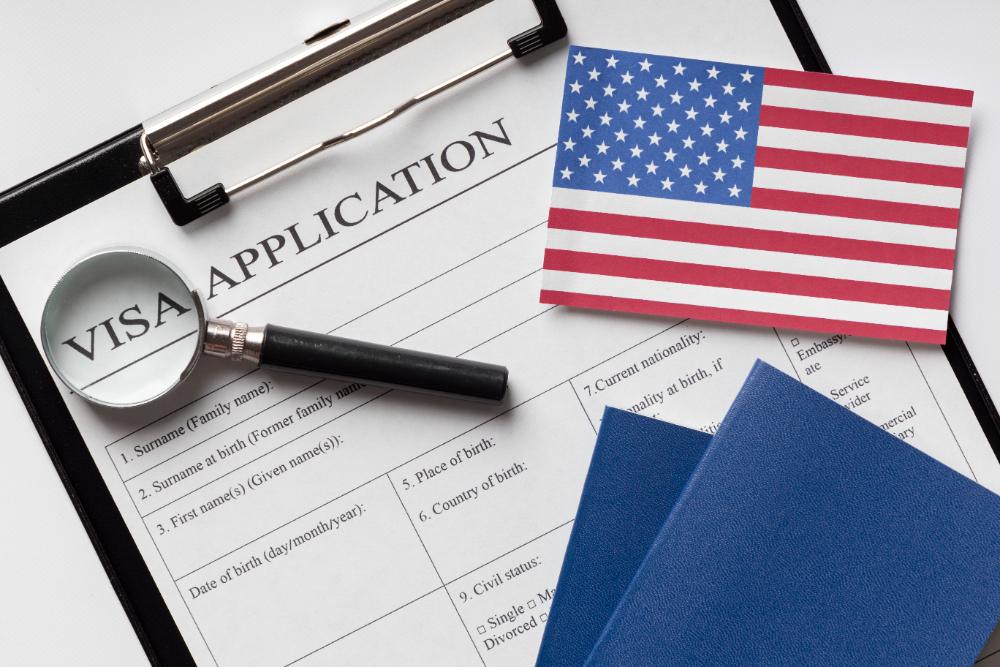J1 Visa for the USA: Eligibility, Application Process, and Requirements
-
J1 Visa, J1 Visa USA, J1 Visa Requirements, USA Study Visa Requirements

Table of Contents
Who is Eligible to Apply for the J1 Visa?
Scroll here ↓What Programs Qualify for a J1 Visa?
Scroll here ↓What Are the General Requirements for a J1 Visa?
Scroll here ↓What is the DS-2019 Form and Why is it Important?
Scroll here ↓What Are the Eligibility Criteria for a J1 Visa?
Scroll here ↓What Documents Are Required to Apply for a J1 Visa?
Scroll here ↓What is the Process for Applying for a J1 Visa?
Scroll here ↓Can J1 Visa Holders Work in the U.S.?
Scroll here ↓What Happens After the J1 Program Ends?
Scroll here ↓What is the J2 Visa and How Does It Relate to the J1 Visa?
Scroll here ↓What Are Some Common Challenges Faced by J1 Visa Holders?
Scroll here ↓What Are the Key Takeaways About the J1 Visa?
Scroll here ↓Who is Eligible to Apply for the J1 Visa?
Eligibility for the J1 visa depends on meeting specific requirements, which vary based on the program type. Here's a breakdown:
- The program you are applying for must be approved by the U.S. Department of State. This approval ensures that the program aligns with the goals of cultural and educational exchange.
- Depending on the program, you may need to have a certain level of education (e.g., completed high school, university degree, or relevant certifications).
- Some programs may require prior work experience related to the field of study or profession. For example, internships or research programs may look for candidates with a background in the relevant area.
- Applicants must prove their ability to communicate in English. This is typically done by passing standardized tests like IELTS or TOEFL. Proficiency is essential for understanding the program and engaging in cross-cultural activities.
- Different J1 visa programs have unique eligibility requirements. For example, an internship program might require that the applicant be a recent graduate, while a research scholar program may require advanced degrees and published work.
- J1 visa holders must have health insurance coverage that meets specific U.S. government requirements for the duration of their stay.
- Applicants must show they have enough financial resources to cover their stay in the U.S., including living expenses and program fees.
- Many programs require applicants to have a strong academic record, especially for research or teaching roles.
Additional Information:
- Age Limitations: Some programs, like Au Pair, have age restrictions (e.g., 18 to 26 years old), while others do not.
- Cultural Intent: The purpose of the J1 visa is to encourage cultural exchange, so applicants must demonstrate an intent to return to their home country after completing the program.
What Programs Qualify for a J1 Visa?
A wide range of exchange programs qualify for the J1 visa. Some of the most common ones include:
- Au Pair: This program allows participants to live with an American family, providing childcare while learning about U.S. culture and improving English skills.
- Camp counselor: Individuals work as counselors at American camps, helping organize activities and engaging with children.
- College and University Student: For students enrolled in U.S. colleges or universities, this program offers opportunities for exchange students to complete a part of their degree in the U.S.
- Intern: Designed for university students or recent graduates, this program allows participants to gain practical work experience in U.S. organizations.
- Professor and Research Scholar: Professionals in academia and research are eligible for this program to teach or conduct research at U.S. educational institutions.
- Short-Term Scholar: This program allows scholars to teach or conduct research on a short-term basis in the U.S.
- Specialist: Individuals with specialized knowledge can come to the U.S. for collaborative projects or exchange of expertise.
Other qualifying programs include government visitors, physicians, STEM initiatives, and secondary school students. Each of these programs is designed to encourage learning and collaboration across borders.
What Are the General Requirements for a J1 Visa?
The primary requirement for obtaining a J1 visa is acceptance into a program sponsored by an accredited institution. The U.S. Department of State monitors these sponsors, ensuring that they comply with federal regulations. The sponsor will issue a DS-2019 form, which is the "Certificate of Eligibility for Exchange Visitor Status." This document is critical in applying for the J1 visa as it outlines the specifics of the participant’s program, such as start and end dates, program details, and estimated costs.
Other requirements include a valid passport, proof of financial capability to support the participant during the program, and proof of health insurance. Health insurance is mandatory for J1 visa holders to cover any medical expenses during their stay in the U.S.
What is the DS-2019 Form and Why is it Important?
The DS-2019 form is the key document for a J1 visa application. It is issued by the sponsor organization, confirming the applicant’s acceptance into an approved exchange program. The form provides details about the exchange visitor’s role, program objectives, and financial information, including estimated costs and funding sources.
The DS-2019 form is essential for scheduling the visa interview at a U.S. embassy or consulate. U.S. immigration officials also use it to track and verify the participant's status throughout the program. Importantly, the form must remain valid during the participant’s stay, and any expiration must be addressed through a formal extension process.
Participants are strongly advised to avoid allowing their DS-2019 form to expire, as this could result in a violation of J1 status and legal complications.
What Are the Eligibility Criteria for a J1 Visa?
While specific eligibility requirements vary by program, there are several general criteria that all applicants must meet:
- English Proficiency: Most programs require applicants to demonstrate proficiency in English. This is typically done through standardized tests like the IELTS or TOEFL.
- Field Experience: Applicants must have experience related to their field of study or work. For students, this could mean a completed degree or ongoing studies. For professionals, relevant work experience is often required.
- Academic Merit: A solid academic background is necessary for most J1 visa programs, especially for research and scholar programs. Applicants are expected to have good grades and qualifications in their respective fields.
- Sponsorship: A key eligibility criterion is being sponsored by a U.S.-approved organization, institution, or government entity. The sponsor must provide the DS-2019 form, which outlines the specific exchange program details.
Once these criteria are met, applicants can proceed with the visa application process.
What Documents Are Required to Apply for a J1 Visa?
The documentation required for a j1 visa usa includes:
- DS-2019 Form: This form, provided by the sponsor, is the most important document for the visa application process.
- DS-7002 Form: For applicants in training or internship programs, this form outlines the details of their training plan. The sponsor is responsible for issuing this document.
- Form DS-160: This is the standard non-immigrant visa application form, which must be completed online before scheduling a visa interview.
- Valid Passport: Applicants must have a passport with at least six months' validity beyond their intended stay in the U.S.
- Passport Photos: These must meet U.S. visa photo requirements.
- Health Insurance: Proof of health insurance is required for both the applicant and any dependents accompanying them.
These documents, along with the appropriate visa fees, must be submitted during the application process.
What is the Process for Applying for a J1 Visa?
The application process for a J1 visa involves several steps:
- Obtain DS-2019 Form: First, the applicant’s sponsor must issue the DS-2019 form, which contains all the details about the program. In the case of interns or trainees, the DS-7002 form must also be provided.
- Complete DS-160 Form: The next step is to complete the DS-160, an online non-immigrant visa application. This form gathers basic personal, travel, and program-related information.
- Pay SEVIS Fee: The Student and Exchange Visitor Information System (SEVIS) fee, which is around $350, must be paid before the visa interview. This fee supports the maintenance of the system that tracks exchange visitors.
- Schedule and Attend Visa Interview: Once the DS-160 and SEVIS fee are completed, the applicant schedules an interview at a U.S. embassy or consulate. The interview will focus on the applicant's background, their program, and their intentions to return to their home country after the exchange.
Can J1 Visa Holders Work in the U.S.?
Yes, J1 visa holders are allowed to work under certain conditions. However, the work must be related to their exchange program, and they are generally limited to part-time employment (no more than 20 hours per week) during academic sessions. During breaks and vacations, full-time employment may be permitted. Importantly, J1 visa holders must
obtain proper authorization from their program sponsors before engaging in any employment. This ensures that the work aligns with the educational or cultural objectives of the exchange program. For on-campus work, J1 visa holders may need approval from their institution, while off-campus work requires specific permission from the exchange program coordinator.
What Happens After the J1 Program Ends?
One of the key conditions of the J1 visa requirements is that participants must return to their home country after completing their exchange program. According to the U.S. immigration law, J1 visa holders are required to return to their country of residence and stay for at least two years before being eligible for certain U.S. visa categories, including H1B or L visas, which allow for longer-term employment or residency.
However, this two-year home residency requirement can sometimes be waived under specific circumstances. A waiver may be granted if the J1 visa USA holder can demonstrate that returning home would cause significant hardship or if their home country government agrees to waive the USA study visa requirements. Other exceptions may apply based on national interest or if the individual works in a field deemed critical by the U.S. government.
What is the J2 Visa and How Does It Relate to the J1 Visa?
The J2 visa is issued to dependents (spouses and children) of J1 visa holders, allowing them to accompany the J1 holder during their stay in the U.S. J2 visa holders are permitted to study in the U.S. and may also apply for work authorization by filing Form I-765. However, the income earned by J2 visa holders cannot be used to support the J1 visa holder's education or program costs.
J2 visa holders are subject to the same two-year home residency requirement as the J1 visa holder. If the J1 visa holder’s program is completed or terminated, the J2 visa holder must also leave the U.S. or apply for a change in visa status.
What Are Some Common Challenges Faced by J1 Visa Holders?
While the J1 visa offers a valuable opportunity for international exchange, there are several challenges that participants may face:
- J1 visa holders can work part-time, but finding a good job can be tough due to the competition and the rules that limit full-time work. They also need to balance their job with the requirements of their exchange program, which can be challenging.
- Health insurance is required for J1 visa holders, but it can be expensive. Monthly costs typically range from $200 to $650, and this can be a big financial burden, especially if they need to cover insurance for family members as well.
- The process of applying for a J1 visa can be complicated. It requires careful attention to filling out forms and paying fees on time. If there are any mistakes or delays, the application might be rejected, leading to legal issues.
- Adjusting to life in the U.S. can be hard for J1 visa holders. They may face language barriers, cultural differences, and new educational systems, which can sometimes lead to stress or homesickness.
Despite these challenges, the J1 visa remains a valuable opportunity for international students, professionals, and researchers to experience life in the U.S., expand their knowledge, and contribute to global collaboration.
What Are the Key Takeaways About the J1 Visa?
The J1 visa offers an unparalleled opportunity for individuals to participate in exchange programs. The J1 visa offers a valuable opportunity for cultural, educational, and professional growth. By carefully following the application process, understanding the program requirements, and preparing for the visa interview, you can make the most of this experience in the U.S.
For students from India, Global Grads simplifies the journey to studying abroad. Our experts guide you through the entire process, helping you choose the best university and course. With affordable master’s programs and expert support, Global Grads makes overseas study applications hassle-free.

Find out Universities in the USA where you get Admission
Check your Admit Eligibility NowRecent Blogs
-

MiM vs MBA: Which MBA Alternative Gives the Fastest Career Lift?
09 November, 2025 Read More › -

How Do You Qualify for a US Student Visa? — A GlobalGrads Guide
23 October, 2025 Read More › -

Study Abroad Scholarships for Indian Students
23 October, 2025 Read More ›






